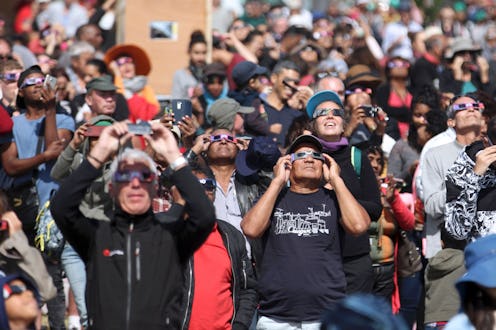Life
Here's What Staring At The Solar Eclipse Can Do To Your Eyes

Finally, on Monday, August 21, the event we were all waiting for happened: The 2017 Solar Eclipse. Happening for the first time country wide since 1918, the excitement had been building for weeks. Across the country, people went out with their eclipse glasses or makeshift cereal viewing boxes, and enjoyed the rare view. Along the path of totality, viewers saw a world that went dark in the middle of the day. In other parts of the country, partial eclipses were watched in awe. While people spent the days leading up the celestial event eagerly searching for eclipse glasses, many have worried about how the solar eclipse can damage your eyes.
While staring directly at the sun is always a bad idea, staring at a solar eclipse has the potential to leave you blind or with permanent eye damage. "I've seen a couple of patients over the years where, you know, you've got very distinct crescent-shaped scars from looking at a solar eclipse," Ralph Chou, an optometrist and vision scientist at the University of Waterloo in Canada, told NPR. While you may not experience complete blindness after looking directly at an eclipse, there is also the potential of getting blurred vision or blind spots after looking at an eclipse of any coverage. This condition is known as solar retinopathy, which occurs when bright light molecules, AKA the sun's rays, kill cells in the retina.
While this might sound like a case of people being overly cautious, take it from someone who has felt the effects of looking directly at an eclipse: Portland resident Louis Tomososki. He was interview by KPTV last week to share a warning about the upcoming solar eclipse from his own experience. When Tomososki, now 70, was 16 he stared directly at a solar eclipse, closing his left eye, and looking with his right. The mistake led to him becoming partially blind in his right eye. Before you assume this was a rare case in the path of totality, Tomososki wasn't even in the path, meaning he only had a partial view. Nevertheless, the rays still burned through this retina. In the 54 years since the eclipse, his blindness has neither improved or worsened.
While the damage that looking directly at the sun can do is immense, people may believe they're fine and continue to look because of a lack of pain. "One misconception about eclipses is that it is safe to stare at the sun because it’s more comfortable to do so when compared to a typical sunny day. Looking directly at the sun, for even a short time, can cause permanent harm to structures in the back of your eye and that damage is irreversible," Dr. Janelle Routhier, Senior Director of Customer Development at Essilor tells Bustle. Not only can humans not see infrared rays coming from the sun, but we also have no pain receptors in our retinas, leaving us susceptible to permanent damage without even knowing it until its far too late. For people who decided to look directly at the eclipse, such as Trump, it can take a few hours or even a few days to realize the damage that has been caused.
While looking directly at the sun can cause these permanent effects, don't be alarmed if you took the necessary precautions and still don't feel well. After my colleagues and I viewed the eclipse through protective glasses, we immediately had strong headaches that felt like extreme eye strain. A few people also felt nauseous. After a short time and two tylenol, the symptoms mostly passed.
Unfortunately, if you did look directly at the eclipse, there is not much that can be done after the fact. "If you think you have damaged your eyes after looking at the eclipse without proper protection, visit your local eyecare professional immediately," Routhier recommends. Hopefully the effects are minimal and, for the next eclipse, you buy a pair of protective eclipse glasses or stay inside. Try not to stress about possible effects you might be experiencing and enjoy the fact that you saw such an amazing display of nature. It was quite something.